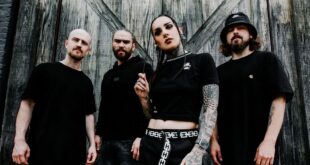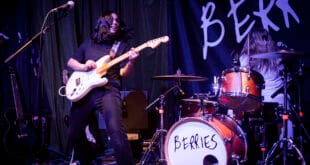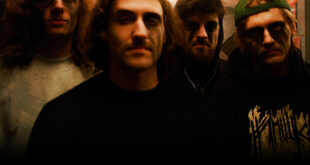 With their second album, ‘…to North’, just released on Metal Blade and garnering great reviews – we at PM awarded it 8.5/10 – we sit down with King of Asgard bassist Jonas Albrektsson (pictured) to discuss said release, the role of mythology in their music and the state of Nordic metal in general.
With their second album, ‘…to North’, just released on Metal Blade and garnering great reviews – we at PM awarded it 8.5/10 – we sit down with King of Asgard bassist Jonas Albrektsson (pictured) to discuss said release, the role of mythology in their music and the state of Nordic metal in general.
First of all, thanks for taking the time to answer a few questions and congratulations on an excellent album…
No problem, our pleasure – thanks for supporting King of Asgard!
Your first album, ‘Fi’mbulvintr’, was generally well received – how much of a progression is ‘…to North’?
Yeah, as you say it was for sure well received, so we kind of went with the positive flow. We don’t really plan that much when writing the basics of our songs. It is when we arrange and put things together the ‘magic’ happens. We work close to each other, me and Karl, turning and twisting to get where a song is finished. For example, the first song we wrote for the ‘…to North’ album was the last one finished: it is ‘The Nine Worlds Burn’, which we had a struggle with, but in the end it turned out to be one of the most powerful songs on the album.
Our aim is actually just to create things we like ourselves and the structures we work upon is often hard-hitting and straight forward which, along with powerfully arranged vocal performances, make the songs. It may sound simple, but it is countless hours laid behind almost every song. We are very self critical and always try our very best to please both ourselves as well as our fans and listeners.
So, to us, it’s not progression that counts – but, sure, we do progress as the band matures and if that comes through I guess it is progress and a step forward: but our main goal is still to bring some good and enjoyable songs. It might be easier for our followers to knowledge such things. But, we feel it’s a step forward and we’re really pleased with its outcome.
You worked with Andy LaRocque again on this album: given his vast experience within the genre, how much influence/input does he have in the recording process, and what sort of a dynamic does he bring to the KoA sound?
Yes, it’s the second time for King of Asgard in Sonic Train studios with Andy, that’s right. Our relationship with Andy and his studio is just getting stronger. Some of us have known him for many years – recording stuff with him in earlier bands and such. He’s just very easy going and cool guy that’s great to work with, actually. He’s always open and responsive to our ideas and goals with the actual recording. So, as we’ve become so close both professionally, and as buddies, things work out just fine and we all know where we’ve got each other and so forth. He helps us get the sound we’re picturing before entering the studio. We tell him pretty much what we’re looking for and he brings it both from his equipment as well as pushing us to our ultimate limit. Andy also kind of co-produces the recordings with us, making our thoughts reality as well as bringing and trying out his own ideas and impressions in and to our music. So, he sure has influence and input on us. He simply has the right equipment, we like working with him and he really enjoy working with King of Asgard and that together bring us out as a whole.
 Your songs are very much steeped in Nordic mythology: can you tell us about a few of the songs on the new album? For example, what’s the background to the opening track, ‘The Nine Worlds Burn’?
Your songs are very much steeped in Nordic mythology: can you tell us about a few of the songs on the new album? For example, what’s the background to the opening track, ‘The Nine Worlds Burn’?
Well, we’re wide spreading actually when you get into our words: it’s not all based on mythology and such – but the songs that are, well, it’s obvious by name, really. ‘The Nine Worlds Burn’ sets off quite harsh, both musically and lyrically: it deals with the onset and peak of Ragnarök myth, and (needed to be) brutal and direct to capture and depict the inevitable and unconditional end.
I really want people to check the lyrics out on the albums and get the feeling and interpretation by themselves as we’re not into preaching or persuasion. ‘Nordvegr’ is sort of a conquest/berserker kind of song, about leaving your enemies in ruin, ‘Gap of Ginnungs’ is about where it all began – the creation story in short – while ‘Plague-Ridden Rebirth’ is a mean apocalyptic anthem but not in the obvious vein at all, more black metal targeted if anything. Then there’s some songs that just give a sense of life of old and the struggles it brought.
‘The Gap Of Ginnungs’ refers to the Ginnungagap, the primordial void that existed before the universe we know: how did you go about encapsulating that void in music?
It appeared quite natural and in some strange way the music and lyric was drawn and fit together very easy. I had some phrases ready which fitted in perfectly with both rhythm and the very feeling of the song, and from there it was actually pretty easy to accomplish what we felt coming. So, when me and Karl, who wrote the tunes, decided we were onto something, we structured things carefully and this is what it became. The mid-tempo and monotone feel really made it and we at least feel we succeeded in capturing some of what the words say, as well as the part where the vocal is spoken. Winding up things with Jimmy’s solo was great as well, as we couldn’t really come up with any other idea. So, we’re glad we tried it out and got it done!
What are the stories behind the other tracks? Is there a concept behind the songs as whole?
Actually not. Our main source of lyrical inspiration is Norse mythology, legends and sagas obviously. But no, there’s no concept behind the ‘…to North’ album as far as it goes throughout the whole album. There are main themes which are based in Norse mythology, prehistoric tales and beliefs, but no more than that actually.
So every song/lyric stands on its own. The title ‘..to North’ kind of reflects upon our Norse heritage and has ambiguous ways of being interpreted. We felt it fitted right away when we came up with it. I don’t think we’ll ever do a concept album – I just feel it doesn’t fit us really: but still, never say never…
Still, we do not limit ourselves to just these topics, so there are other matters to reflect upon within our lyrical content. It is probably, or certainly, the name King of Asgard that’s that kind of made us paint ourselves into that corner. But our tentacles reach far!
Nordic metal has seemed to go round in circles – starting out very much in a Satanic black metal vein, then briefly reclaiming its pagan roots, before going back into its blacker aspects: now, the circle seems to be turning again – is that a fair comment?
I think you could be right there, I guess. It seems that things turn back to their origins, and extreme (music), when it kind of peaks in its own over-exposure (or something) kind of self-eradicates itself and goes back to where its roots lay broken. Which I find good, though, as a protector of old.
Viking metal, as it is known in the UK, has often been lumped in with black metal, as being anti-Christian, because of its roots in the pagan Nordic cultures – but this is an assumption which is often seen as unfair, as the Viking and Christian heritages are not necessarily exclusive: we would be very interested in your views on this debate…
I don’t think I’ve ever reflected on the matter, to be honest, but, sure,what you say is very true. I guess it just ends up this way as being, in brief, a vengeful way of expressing itself and thus automatically gets judged as this and/or that. I don’t think there are many that treat this subject in that way either, as it somewhat emerged from the view that Christianity came and took away what we had and was our very origin, thinking of ancestors, heritage and times of old. Thus, this recapturing and retaliatory expression. So, it’s really hard to speak for every band, as they deal with similar subjects in their own ways, and maybe that is yet another reason for getting lumped in with black metal or whatever sub genre. A simple way of not complicating things. Understandable at times.
 We’ve spoken to quite a few Celtic – i.e. Irish – bands recently, and they very much see themselves as custodians of ‘the old tales’, for want of a better description – retelling the stories once told by their ancestors, only through the medium of heavy metal: is this a role you see yourself and other Scandinavian/Nordic bands fulfilling as well?
We’ve spoken to quite a few Celtic – i.e. Irish – bands recently, and they very much see themselves as custodians of ‘the old tales’, for want of a better description – retelling the stories once told by their ancestors, only through the medium of heavy metal: is this a role you see yourself and other Scandinavian/Nordic bands fulfilling as well?
I can only speak for ourselves, of course, but I’m pretty sure it is as you say here as well. King of Asgard is surely about re-telling and bring sagas and myths forward to others. We also depict our own ideas and conceptions upon the matter or actual time. Still, we’ll keep close to Norse mythology and such as it’s a treasure and heritage we want to keep and bring. It’s a great source of inspiration. We draw parallels to present times as well as just re-telling of the old. There’s also lots of room for the listener’s/reader’s own interpretation, which is interesting, as our lyrics often can be seen in many different ways or, as in some, very straight forward and direct.
Do you think there are any parallels between these ancient tales, the traditional mythos of both the Celtic and Nordic races, and the modern world? Is it a case of longing for the old days, of looking back, through the mists of time, for inspiration, for signs of how to deal with modern life – or are they just stories?
Sure, there are parallels ranging from a long, long time ago into the modern world, not least because so much has been influenced by the values and ways that were created back then. When adopting the whole, one sees quite clearly what effect it had on the lot that is our daily lives and, if you want to see it in a more spiritual way, one absolutely knows that it (what happened in the past) took and put a firm grip on what we’ve become. If you want to make use of the past, it is definitely possible, both on a personal level, or as a plain inspirational source – the latter which is the way of King of Asgard. So, there are many and we feel it’s important to pass it on to further generations and such.
You also, like many of your contemporaries, utilise traditional melodies in your songs: how important is this to the King of Asgard sound?
It’s not of importance, actually: it is more something we feel fits in, the small amount we’re using. We feel it fit real well and gives a touch that authenticates our overall concept. And now, as our sound has found a good and steady base to work upon we feel the blending of traditional, say folk tunes, fit us very well. So, it’s become a part of our sound and an important feature, as it is something we like ourselves to bring into our creations as well as bring out to others. Also, it comes naturally when we plan and create our stuff, as we were brought up with traditional melodies, as we’re from a part of Sweden steeped in history and heritage.
So, with the album now finished and about to be unleashed on a possibly unprepared world, what are your touring plans to support it? Obviously we’re most interested in any plans to visit the UK/Ireland…
At the moment, I’m afraid there’s not much I can tell you, but we would sure like to come to UK and Ireland – no doubts about that! We have yet not got any offers, so that’s the simple reason, but when the right offer is made to us and we have the opportunity, we’ll sure do it. With all beautiful surroundings and berserker KoA followers we sure hope it’ll be soon, so it would be great in all aspects.
Thanks for your time. Can we finish off by asking for a few words of Swedish that every self-respecting metaller should know?
Thanks a bunch for supporting King of Asgard!!!! And Skål, för helvete!!!!
Band portrait by Rickard Moneus.
Read our review of ‘…to North’ at http://planetmosh.com/king-of-asgard-to-north/
Watch the video to ‘The Nine Worlds Burn’ at http://www.youtube.com/watch?v=ONcF4GDiSUI
You can buy ‘…to North’ from http://www.metalblade.com/kingofasgard/
Follow King of Asgard at http://www.facebook.com/kingofasgard
 PlanetMosh Keeping it Metal
PlanetMosh Keeping it Metal


